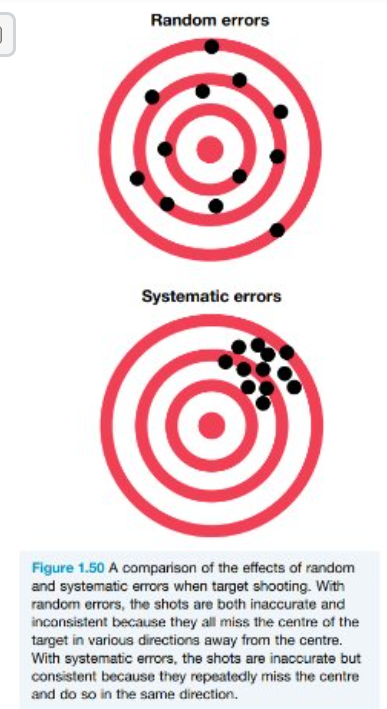10. Sources of error & their control or minimisation
Errors:
Random Errors:Affect precision of a measuremen
Affect precision of a measurement and are present in all measurements, except for measurements involving counting.
error due to chance factor or chance variation in a measurement
occur arbitrarily or indiscriminately when unknown or uncontrolled factors affect the measurement process or variable being measured.
May change the measurement & results obtained in either two directions→ positively or negatively
Many random errors cannot be eliminated but their influence can be controlled or minimise
can be limited by:
making more repeated measurements & calculating new mean, Refining the measurement method or technique
Example, Memory task→ Factors affecting individual participant’s performance
upbringings
Motivation
mood
alertness
how they learn and commit new information to memory.
Systematic errors: affect accuracy of a measurement
Produced by some factor that consistently favours one condition rather than another
associated with a flaw in some aspect of the research design, its procedures or implementation
Affect all measurements in the same way so that the error is always made in one direction, either positive or negative, and do not cancel out.
Errors are foreseeable & therefore a preventable source of bias.
Can often be detected and corrected during statistical analysis of result.

Random vs Systematic errors:
Random errors affect the precision of the measurement whereas systematic errors affect the accuracy of the measurement
Random errors are evident when the degree of error varies each time & systematic errors are evident when the measurement has teh same degree of error each time
random errors reduce both the consistency(reliability) and accuracy (validity); where as systematic errors reduce accuracy (validity) but not consistency (reliability) as the error is always in the same direction.
Personal errors/ Human errors:
Faults entirely sourced with the researcher
mistakes
miscalculations
slip-ups
observer error
Extraneous & Confounding Variables:
Random & systematic error that can have unwanted effect on the dependant variable & therefore the results of the experiment.
Extraneous:
Any Variable other than IV that may cause change in DV
when more than one extraneous variable present in experiment, it can be difficult to conclude with any confidence that any change in the DV was caused solely by the IV.
Confounding variables:
Variable can not be separated from the IV has an affect on the DV and can not be
Experimenters can not determine if it is the IV or the confounding variable that produced predicted change in the DV.
compromises internal validity of experiment
Confounding variable produces measurable change in DV
Extraneous variable may or may not affect the DV
Extraneous variable may become confounding variables.

